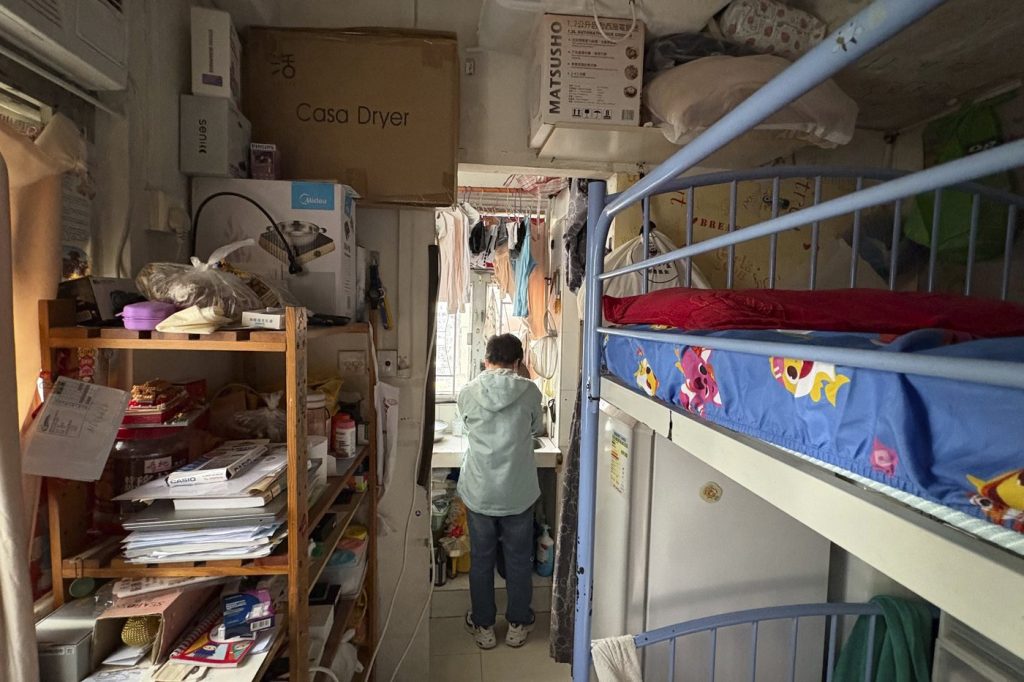HONG KONG (AP) — In Hong Kong, a city known for its exorbitant housing prices, many residents are grappling with the realities of living in subdivided apartments. One such resident, Jimmy Au, faces the daily challenges of her cramped home, which is significantly limited in space. Au resides in a unit that has been carved out of a larger apartment, compromising on comfort, privacy, and safety as she shares a bunk bed with her husband and son. The limited space leads to frequent disturbances from neighbors, and privacy is almost nonexistent due to a mere curtain separating the bathroom from the kitchen.
The impending reforms introduced by the Hong Kong government add another layer of anxiety for Au and many others. The government aims to address what it terms inadequate housing in subdivided units by enforcing stricter standards, including a minimum size requirement and basic amenities. A public consultation period for these proposed regulations recently concluded, with the aim to instate these laws later this year. The new regulations are expected to leave many low-income families uncertain about their housing situation in one of the world's least affordable cities.
Au, originally from mainland China, moved to Hong Kong nine years ago and pays about $460 a month in rent for her cramped living quarters, which accounts for nearly half of her husband's irregular income from renovation jobs. The thought of rent increases under the new regulations causes her great concern. "I'm afraid the rent will get so high we can't afford it," Au expressed, as she sat surrounded by the clutter of their daily lives in her small living space.
Housing conditions in Hong Kong are a critical issue, as approximately 7.5 million residents live in a densely populated territory primarily composed of steep slopes, leaving only 7% of the city’s land designated for residential purposes. The market is characterized by staggering prices; for instance, in December 2022, the average cost for a less than 40 square meter apartment was between $13,800 to $16,800 per square meter, depending on the district. The situation is further complicated by Beijing's desire to phase out subdivided units entirely by 2049, viewing the lack of adequate housing as a potential catalyst for unrest, akin to the protests witnessed in 2019.
The proposed measures include requirements for units to have a minimum area of at least eight square meters (86 square feet), windows, and toilets that are exclusively for the occupants' use. Landlords will be given a grace period to renovate their properties, after which potential violations could lead to imprisonment and substantial fines. Despite the government claiming that most subdivided apartments might only need minor renovations, they estimate that around 33,000 units will require substantial upgrades to meet the new standards.
Residents like Fafa Ching, a security guard who has lived in subdivided flats for over a decade, fear that these upgrades will be financially unfeasible. Ching, currently residing in a unit that rents for $490 a month, faces a number of deficiencies, including the absence of a bathroom sink. As the government claims to boost public housing supply, aiming to deliver 189,000 flats within the next five years, there remains skepticism regarding whether this will sufficiently cover the demand of approximately 220,000 individuals relying on subdivided accommodations, which include migrants and young professionals.
Experts like Chan Siu-ming, a professor at City University of Hong Kong, have expressed cautious support for the government's initiative to set minimum housing standards but criticize the inadequacy of resettlement plans. Public housing waiting times can be excessively long, with applicants often waiting five and a half years or more, intensifying the issue for those in need. The current average wait time could stretch even longer for those like Ching, who have already been waiting for eight years.
The government has attempted to reassure residents by proposing assistance measures, such as helping tenants find alternative housing or providing temporary shelters. However, the reality for many could differ significantly from these promises. Some residents have already reported being pressured to vacate their subdivided units as landlords preemptively comply with impending regulations, highlighting the need for better coordination from the government to address the immediate housing crisis effectively.
In conclusion, the situation for subdivided housing residents in Hong Kong remains precarious as they face an uncertain future amidst proposed reforms to address inadequate living conditions. With pressure mounting on landlords and the government’s promise of improved housing supply, residents like Jimmy Au must navigate their daily lives with a significant degree of anxiety regarding the security of their homes.










